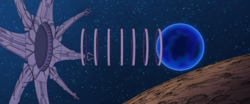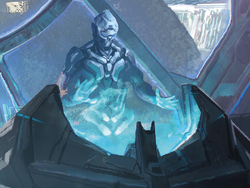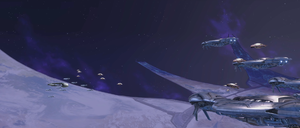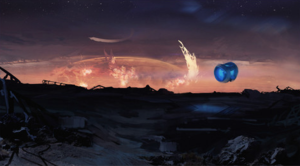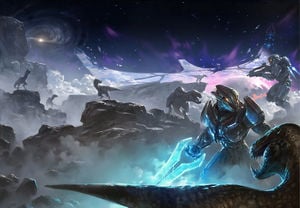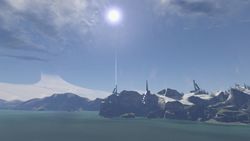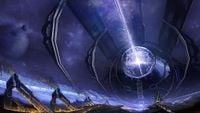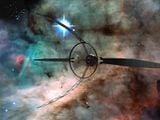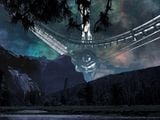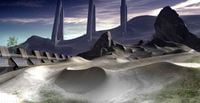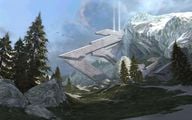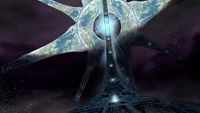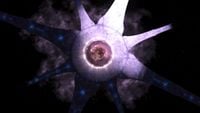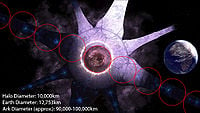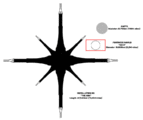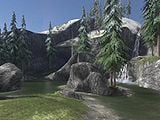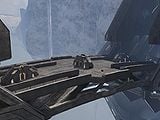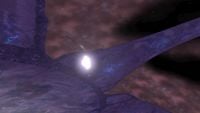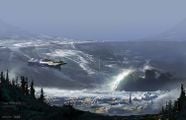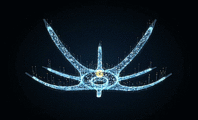Installation 00
From Halopedia, the Halo wiki
| Installation 00 | |
|---|---|

| |
| General overview | |
|
Description: |
Disk with a hollow core and eight curved arms |
|
Location: |
Intergalactic space, over the galactic plane, 262,144 light years from galactic center |
| Operation overview | |
|
Type: |
|
|
Function: |
Conservation installation, Lifeworker research station, Halo construction foundry and remote activation facility |
|
Attached AI(s): |
000 Tragic Solitude (destroyed) |
|
Date of construction: |
|
|
Heavily damaged: |
December 11, 2552[1][2][3][4] (Fully repaired by March 2559)[5] |
| Structural information | |
|
Diameter: |
127,530 kilometres (79,243 mi)[4] |
|
Day length: |
35.3 hours (adjustable)[6] |
|
Gravity: |
1G[4] |
|
Surface temperature: |
-30°C to 50°C (-22°F to 122F°)[4] |
|
Atmospheric composition: |
|
- Miranda Keyes: "Where would someone go to activate the other rings?"
- 343 Guilty Spark: "...Why, the Ark, of course."
- — 343 Guilty Spark to Commander Miranda Keyes
Installation 00, also known as the Ark and sometimes translated as Waypoint,[7] is a Forerunner installation from which the entirety of the Halo Array can be activated.[8] Installation 00 also functions as a potential safe haven from the Halo Array's strategic pulse, and as a facility to construct replacement Halos if necessary. The Ark is situated outside the galaxy, about 218 (262,144) light years from the galactic center.[9] Although later universally known as "the Ark", Installation 00 was originally one of two installations identified as Arks, the other being the older greater Ark. Due to this, Installation 00 was also referred to as the lesser Ark to differentiate it from the much larger greater Ark, whose foundry produced the original array of rings 30,000 kilometers in diameter, as opposed to the 10,000 kilometer-wide foundry of Installation 00.[10]
Overview
The Ark was designed with a number of functions, one of which is to remotely activate the Halo rings from outside the array's blast radius. Installation 00 can be placed on standby mode via a fail-safe system that is activated by an aborted firing such as the one that occurred at the end of the Battle of Installation 05. In addition to serving as the firing control center for the Halo array, Installation 00 functioned as an automated factory to construct Halo installations, thereby ensuring that the Halo Array was always ready to fire.[11][12] While originally designed solely as a construction and control center for the Halos, due to the Librarian's influence, the Ark was given a secondary function as a safe haven for life in the galaxy in the case of a galaxy-wide activation of the Halos; this is also the source of the name "the Ark".[13] Knowing that the Array would defeat the Flood through sterilizing the galaxy of any neurologically complex life, the Forerunners planned to preserve all life by storing it on the Arks and other preservation facilities. According to this plan, known as the Conservation Measure, the Librarian was to index every sentient species in the ecumene and bring specimens of each to the Ark. These sentient species would be stored on the Ark and would later be reseeded on their original homeworlds after the Halo Array had been activated.[14]
History
Forerunner-Flood war
- "Every vessel we can fill, we send to the Ark. I dare not cease the mission. Not now, not until I've done all I can. Each one of these souls is finite and precious. And I'm close. Close to saving them all."
- — A message from the Librarian to the IsoDidact
Like the rest of the newer, more efficient Halo Array, Installation 00 was constructed sometime between 98,445 BCE and 97,445 BCE under orders of Master Builder Faber, to address problems with the greater Ark and its larger Halos. While plans for the second Ark had existed for some time, its construction was delayed by the Old Council to avoid the Builders from gaining too much power.[15] The lesser Ark, as it was known at the time, was designed to produce smaller but much more powerful Halo rings, which could be transported more efficiently and could deal far more widespread damage. Until the very last days of the Forerunner-Flood war, the lesser Ark, its new Halos, and its location were kept a well-guarded secret; only the most top-tier Forerunners knew of its existence, and the only one who knew the exact coordinates of the installation was Faber. Whereas the greater Ark acted as the Forerunners' final line of defense and command center, the lesser Ark would serve the function of a last fallback point where its own array of rings could be swiftly distributed to their designated locations across the galaxy and fired to cleanse the galaxy of all sentient life as a last resort.[16]
In the endgame of the Forerunners' war with the Flood, the Forerunner Contender-class artificial intelligence Mendicant Bias, which had been corrupted by the Gravemind and defected to the Flood, attacked and destroyed the greater Ark, killing the majority of the remaining Forerunners who had taken refuge there. Using coordinates provided by the Master Builder, a handful of survivors, including the IsoDidact, managed to escape to the lesser Ark where they prepared their weapons of last resort. In order to buy the IsoDidact time, the Librarian traveled to Earth, broadcasting a feint transmission intended to draw the Flood's attention to her. She spent her last days in the plains near Mount Kilimanjaro, near the site of the slipspace portal to Installation 00. Mendicant Bias knew of the secret Ark and how to access it through the Keyships, though he did not know of its exact location. In order to devise the best possible defense against Mendicant Bias, the Forerunners deployed Offensive Bias, a military AI formerly in control of the greater Ark and Mendicant's replacement, and sent it to counter Mendicant Bias' fleet in advance before it could reach the Ark. While Offensive Bias engaged Mendicant's fleet, the IsoDidact completed preparations for the Halo Array and fired the rings from the Ark, purging the galaxy of all life.
Following the Array's firing, Offensive Bias defeated Mendicant Bias within minutes. Offensive decided to spare the last portion of its opponent and delivered it to Installation 00 for study. There, the remaining Forerunners, led by the IsoDidact, held a trial for the AI for betraying the ecumene. The Didact decided to keep Mendicant alive as it had intimate knowledge of the Flood and could be called upon in case of their return. Bias was entombed in the installation with only one thought allowed to him: atonement.[17]
Battle of Installation 00
- Main article: Battle of Installation 00
Immediately following the Prophet of Regret's botched invasion of Earth on October 20, 2552, the Prophet of Truth dispatched a Jiralhanae-led fleet to continue the assault and to uncover what he believed to be the Ark. By November 17, the Covenant had uncovered the structure they had spent the last month unearthing. Truth, through his Forerunner Dreadnought, activated the device, which was actually just a portal-generating structure which led to Installation 00.
Truth led his fleet through the portal; after defeating a Flood invasion of the town of Voi, a joint United Nations Space Command - Sangheili strike force followed the Prophet's forces.[18] Upon their arrival on December 11,[1] the latter force were attacked by the Covenant, which held a 3:1 numerical advantage.[9] Despite this, the Sangheili Fleet of Retribution crushed Truth's forces.
After engaging the Covenant across the installation, Spartan John-117 and Arbiter Thel 'Vadam entered the citadel, where they found Truth, who had become infected by the Flood and deactivated the array. Soon after 'Vadam killed the Prophet, effectively destroying the Covenant and ending the war, he, the Master Chief, and 343 Guilty Spark, the former monitor of Installation 04, discovered that a replacement Installation 04 was being constructed by the Ark's Foundry.[11] The Spartan and the Arbiter soon rescued the AI Cortana, who held Installation 04's Activation Index, from the Flood-infested Covenant capital city, High Charity.[19] They, with Sergeant Major Avery Johnson, assaulted the Halo's Control Room to activate the ring, destroying both the Flood and the remaining Covenant forces. They succeeded, though Johnson was killed by the monitor. While Guilty Spark refused to allow his new Halo to be destroyed, he also implied that he was protecting the Ark. The partially constructed installation's activation tore the ring apart and severely damaged the Ark.[2][3][12]
Post-battle
In March 2553, the Office of Naval Intelligence deployed an automated probe-carrying spacecraft to the damaged Ark using advanced slipspace technology. The ship arrived in November and dispersed its probes, although all communications with the devices were cut off after initial transmissions confirming the Ark's survival. In response, the UNSC Rubicon was sent from Luna in December 2553 to conduct a more thorough investigation of the installation's ravaged surface.[20] Due to the damage dealt to the Ark's life support systems and its artificial sun, heavily inclement weather became the norm.[21]
The ''Rubicon'' carried several remote contact teams, who landed on the damaged Ark and attempted to find the source of the mysterious signal. After about eight days, contact with all teams was lost; only one team, RCT-06, returned, having sustained heavy casualties and carrying with them a device of unknown nature. The armature's origin was subjected to debate, but it was believed by the team to be the source of the beacon picked up by the initial investigative group.[21] The device, actually a broken, barely active monitor, began to relate its past life as a human: Chakas. Though the ship's ONI attaché initially doubted the veracity of the monitor's account, the science team leader pointed out that it was consistent with the "Bornstellar Relation" found on Onyx.
Eventually, the monitor revealed that it was none other than 343 Guilty Spark himself. Claiming that he knew the location of the Librarian, whom he believed to be alive, Spark subsumed the ship's AI, knocked out the crew via the life support systems, and hijacked the ship.[22] Communications with the Rubicon halted within 48 hours of its last report. Search and rescue teams were then deployed to the site, but reported no findings.[21]
The last of its ground team, Bobby Kodiak, was left stranded when the Rubicon left, and mortally wounded by attacking chaefka. It was then that he was contacted by the Ark's monitor, 000 Tragic Solitude, who had survived the Ark's devastation and sought to repair the station and get revenge. Offering him a chance to live, Tragic Solitude rescued Kodiak and mended his body with cybernetics, turning him into a cyborg and putting him under the monitor's control. For the following two years, Tragic Solitude partially repaired the Ark and prepared for an attack on the galaxy. Tragic Solitude was able to repair the Ark end of the Portal at Voi and increase its power so that the portal would transport objects near-instantaneously between Earth and the Ark, but he couldn't activate the portal as the firing of Installation 08 had severed the monitor's control over it.[23]
Operation: FAR STORM
- Main article: Operation: FAR STORM
In 2555, the Ark was partially restored and Tragic Solitude enacted its plan. Using Kodiak to activate the process, Tragic Solitude initiated a countdown to the rings' firing in several weeks. This was so that someone within the Milky Way galaxy would open a portal to the Ark in an attempt to stop the countdown, allowing the monitor to dispatch its Retriever Sentinels to kill all sentient species and mine their planets to repair the Ark. The countdown was discovered on the intact Halo rings soon after and a human-Sangheili joint task force departed to the Ark through the Portal at Voi. The expedition's ship was intercepted and brought down above the Ark by Tragic Solitude's Retrievers, but the crew survived and managed to reach the Array's control center and stop the countdown. However, the portal was still open and Tragic Solitude deployed a fleet of Retrievers to Earth in an attempt to mine the Sol system's worlds, causing heavy damage to the region surrounding the portal as well as the UNSC Home Fleet. However, the UNSC-Sangheili crew managed to thwart the monitor's plan and the Retrievers were recalled, with the monitor ending up destroyed. UNSC reinforcements were deployed through the portal to the Ark soon after and rescued the expeditionary crew. With Solitude destroyed and the Retrievers now dormant, the UNSC began to establish research facilities on the Ark and study the Sentinels in hopes that they could be commanded to continue repairing the installation by strip-mining lifeless systems so that no one would be harmed in the process.[23]
Repairing the Ark and research
In 2557, a human research team traveled to the Ark aboard Eden Rising to establish a permanent base on the Ark, the Henry Lamb Research Outpost. The scientists reactivated the dormant Retriever Sentinels which were dispatched to lifeless systems to strip-mine them for the needed resources and under the guidance of the Smart AI Isabel, began nudging along repair efforts.[24] However, over time, the process became fully automated and the scientists could simply sit back and watch the wonder of a world being reborn.[25] Within three months of the establishment of the Henry Lamb Research Outpost, there would be a new shift in the outpost's surroundings as the Sentinels repaired and rebuilt the Ark. Dense forests sprang up from pit-black, barren terrain over the course of a week and archeologist Nathaniel Palmer monitored a particularly virulent strain of weed that was checked by the reintroduction of voracious, insectoid parasites before it could strangle the budding plants nearby.[26] The Ark showed itself to be remarkably adaptable to change, with Palmer witnessing as giant tectonic plates rearranged, shifted and unfolded to form a new pathway across a chasm.[27]
New arrivals
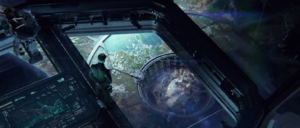
- Main article: Second Ark Conflict
- "And now the Ark's defenses stir, sensing the shadow of a threat that moves in spaces Her eyes cannot see, intent on seizing the great factory of the Forerunners."
- — Curator on the Created and the Banished[28]
Following the Created takeover of human space on October 28, 2558 the Ark's failsafe measures prevented Cortana and her allies from being able to access the installation.[28] A month later, the Banished, led by the Jiralhanae warlord, Atriox, laid siege on the UNSC bases on Installation 00, among them the Henry Lamb Research Outpost.[29] Shortly after the Banished's attack, the UNSC Spirit of Fire, drifting in space for 28 years, was abruptly transported to the Ark by a mysterious entity. Those on board the Spirit of Fire came into conflict with the forces of the Banished on the surface soon after. During the battle, it was discovered that the Ark had constructed a new replacement Halo, which was launched by Professor Ellen Anders in an effort to deploy it to the Soell system and raise a distress beacon to the UNSC. However, the Halo was intercepted on the way to Soell by a Created Guardian, while the forces of the Spirit of Fire and the Banished remained in conflict on Installation 00.[5]
During this time, the Flood, who had survived aboard the ruins of High Charity, were inadvertently released by Voridus and Pavium when they breached the containment shield around the structure with a Scarab and deactivated the Ark's Sentinel defense network in the process. The Flood began a second rampage on the Ark, forming a Proto-Gravemind that quickly began turning into a Gravemind. Voridus and Pavium managed to reactivate the Sentinel defense network and with the help of a Retriever Sentinel, killed the Proto-Gravemind before it could finish its transformation into a Gravemind. With the Proto-Gravemind dead, the Banished and the Ark's Sentinels were able to contain the Flood once again and seal off High Charity.[30]
In October 2559, more Banished forces and members of the Keepers of the One Freedom manage to open a Slipspace portal to the Ark from Reach and travel through it. The portal closes behind them, but Veta Lopis and the Ferrets follow them through, sending ONI a message about their actions through Blue Team along with the fact that Atriox's return is expected.[31][32]
Design details
Installation 00 resembles a massive flattened dish with a series of eight curved arms, known as spires, four large and four small, arranged around its rim, similar to the petals of a flower. The entire upper surface is terraformed, with oceans, forests and deserts.[9][11] Installation 00 is 127,530 kilometres (79,243 mi) in diameter and thus one of the largest known Forerunner constructs.[4] Spread throughout the installation are hundreds of refugia, artificial biomes designed to sustain diverse flora and fauna as part of the Conservation Measure. Each of these refugia are separated by massive quarantine walls.[6] Twelve refugia are located on the central hub, while an additional twenty are located on the arms of the structure.[33] The various refugia are intended to mimic common planetary environments - one such refugia known as the Halo Refugia[34] bore a notable similarity to Earth's climate, though much more extreme; mountains are higher, chasms are deeper and the sea and sky are a deeper blue.[34]
At the center of the installation is the Foundry, an enormous circular facility used to construct Halos. The core of the 10,000-kilometer-wide Foundry is a hollow space, home to a stripped remnant of a material-rich celestial body used to obtain the vast amounts of resources required for the construction of a Halo ring. When active, the Foundry generates so much heat that the Ark requires multiple cooling stations. At least two such systems span a snowy gorge; it is possible that the massive cooling systems caused this icy climate.[35]
Like the shield worlds, Installation 00 possesses an artificial sun.[9][11][12]
Like the Halos, Installation 00 features multiple Cartographer facilities, map rooms that can pinpoint any location on the installation.[9][36][37] Similarly to the Halos, the Ark features a control room from which the array could be activated. This facility, known as the citadel, is protected by a system of energy shield barriers that encircle the center of the disk. These barriers are controlled by towers that circumscribe the center of the installation.[11]
The Ark also possesses a vast network of power grids beneath its surface. These grids can be tapped into by structures on the surface known as Power Nodes when extra locational power is needed in emergencies. These nodes were co-opted by UNSC and Banished forces in 2559, though Banished Power Extractors were also able to tap into these power networks.[38][39]
Defenses
Similar to most Forerunner installations, the Ark had its own monitor, 000 Tragic Solitude, charged with the facility's defenses. For the most part, Solitude reacted little when humanity and the Covenant arrived at the Ark, though when 343 Guilty Spark attempted to access the Ark's systems during the Battle of Installation 00, Tragic Solitude threatened to add the monitor to the facility's targeting ledger if he persisted.[40] After the Ark was severely damaged by the destruction of Installation 08, the latest on a line of destroyed Forerunner relics, Solitude grew bitter and viewed all sentients in the galaxy as incapable of being peaceful.[23] The arrival of the Human-Covenant War to the installation additionally prompted the activation of Terminus', structures that are designed to perform tireless cataloging, recording of indexing of events in an attempt to prepare countermeasures and defences for future possible scenarios. These records are cross-references with existing records of historical events and battles to perform simulations and predictions of potential outcomes - losing a terminus would result in a massive loss of operational capability for the installation.[41]
The Ark's small defenses were Aggressor Sentinels created by numerous Sentinel factories just like at the rings. The Retriever Sentinels could also be used offensively, though they were not usually outfitted with weapons until Solitude began arming them. The Ark was also guarded by armigers, humanoid defense droids that were capable of attacking with energy rifles and staves. Tragic Solitude could also take control of the Ark's wildlife and even people through manipulating their brain waves.[23]
After the Battle of Installation 00, Tragic Solitude had a containment shield erected around the ruins of the Covenant holy city of High Charity to contain any surviving Flood within. He also had the Ark's Sentinels raze the perimeter and modify the refugia so that no sentient life survives nearby to deprive the Flood of any host bodies in close proximity to their prison.[42]
Another method of defense are particle cannons upon the Ark's surface. After discovering the location of one through one of the Ark's Cartographers,[36] the smart AI Isabel had Professor Ellen Anders use it to attack the CAS-class assault carrier Enduring Conviction. The cannon alone wasn't powerful enough to destroy the ship, but after thirty minutes of sustained fire could take down its shields and leave the ship vulnerable to other methods of attack.[43][44]
The Ark also possesses a Sentinel defense network that coordinates Sentinels to assemble and attack anything deemed a threat to the Ark. Isabel utilized the network to destroy the Enduring Conviction by firing the assault carrier's energy projector at the Ark, alerting the Sentinels in the area.[45] Prior to the launch of Installation 09, the security protocols was heightened to finalize the preparation for the launch to its original site and as the part of protocol, the Sentinels release Retriever Sentinel to cleanse the Installation from the threat, including the UNSC and the Banished.[46] During an operation led by Major Vaughan, a Controller Sentinel attacked anyone it deemed a threat, even the UNSC, due to constant abuse of the teleportation network before the Spirit of Fire's arrival.[47] Voridus managed to shut down the Sentinel defense network around High Charity's crash site, but at the price of the Flood being released from the ruined city after he breached the containment shield with a Banished Scarab. When the network was reactivated, the Sentinels resumed their duties and aided the Banished in defeating the Flood, enabling them to enact the containment protocol once again.[30]
Environment
The Ark has a habitable surface on each of its spokes and on the majority of the inner circle, apart from the foundry. This terrain was intended to support cataloged life forms prior to being reseeded throughout the galaxy.[48] These landscapes and biomes are as diverse as those of Earth and of the Halos, including deserts,[9] taiga,[11] and deciduous forests.[49] Several bodies of water occur across the installation. As such, the Ark can sustain its own ecosystem, providing a variety of habitation for many kinds of life.
Like most Forerunner constructs, the Ark's atmosphere is similar to that of Earth, being mostly comprised of oxygen and nitrogen. This means that all known sentient species, with the exception of the Unggoy, can survive on the surface without any form of protection. As with the Halos, Installation 00 features a widely varying range of climates.
As the Ark is located outside the galaxy, isolated in a black void of space, there are no nearby natural sources of light to power the installation and facilitate the survival of biological organisms on its surface. To counter this problem, the Ark is equipped with an artificial structure consisting of a bright, sun-like light, with several metal arms jutting from its center. The light source "scans" over certain areas to generate day/night cycles, further contributing to the growth of vegetation and controlling weather patterns.[50] A standard day on the Ark is 35.3 hours long, though this can be adjusted.[6]
The activation of Installation 08 inflicted substantial damage to the Ark. While some life support units remain intermittently active, they were in severe disrepair. Combined with the artificial sun's weakened output, weather conditions on the surface have became highly volatile. Most indigenous fauna have perished, either from the Halo pulse itself or the extreme weather that came afterwards.[21] However, some wildlife survived and were seen during Operation: FAR STORM.[23] After the destruction of 000 Tragic Solitude, Luther Mann stated a belief that it was in fact the rogue Monitor who was behind the weather conditions as part of his plan for revenge. Once Tragic Solitude was destroyed, the weather returned to temperate conditions.[51]
While under repair by Retriever Sentinels, there would be a new shift in the Ark's surroundings as the Sentinels repaired and rebuilt the Ark. Dense forests sprang up from pit-black, barren terrain over the course of a week and a particularly virulent strain of weed was checked by the reintroduction of voracious, insectoid parasites before it could strangle the budding plants nearby.[26] The Ark showed itself to be remarkably adaptable to change, with giant tectonic plates rearranging, shifting and unfolding to form a new pathway across a chasm.[27] Having begun in 2557, the process was completed by the arrival of the Spirit of Fire in 2559, leaving the Ark fully repaired and habitable again, though wreckage from the Battle of Installation 00 persisted across the Ark's surface.[5]
Slipspace portals
A major aspect of Installation 00 was its ability to send and receive objects via slipspace portals. Late in the Forerunner-Flood war, the rebuilt Halo array was dispersed throughout the galaxy through the use of these portals.[52]
In order to ensure the safety of humanity, the Librarian established a portal-generating structure near Mount Kilimanjaro on the human homeworld of Erde-Tyrene.[53] During the Human-Covenant War on November 17, 2552, the Covenant forces under the command of the Prophet of Truth utilized this portal, sparking the Battle of Installation 00. The portal was damaged by the firing of Installation 08 and shut down while the UNSC Forward Unto Dawn was still in transit.[9][18] The portal was eventually repaired and used again in 2555 by Tragic Solitude, though he could not activate its doorway to Earth from the Ark's end due to the firing of Installation 08 severing his control over it. Tragic Solitude managed to increase the power to the portal exponentially, causing travel between Earth and the Ark to be almost instant.[23] After the start of the Created conflict, the Ark's failsafe measures closed it again to keep the Ark out of Cortana's hands.[28] Professor Ellen Anders was unable to figure out how to reactivate it from the Ark, necessitating the launch of Installation 09 in an effort to make contact with the UNSC.[43] Following the departure of Anders and the Halo ring, Captain James Cutter felt that the portal should remain closed until the Spirit of Fire could fully evaluate the Banished threat to it. Cutter ordered Isabel to start investigating the portal's controls in case they needed to open or close it again.[54]
An unknown entity at the Ark generated a portal to transport the UNSC Spirit of Fire, which had drifted in interstellar space for 28 years, to the installation in 2559.[55]
After hijacking the UNSC Rubicon, 343 Guilty Spark used one of the Ark's remaining active portals to return the ship to the galaxy in an effort to find the Librarian. However, after its return to the Milky Way, the Rubicon crashed on Geranos-a.[56]
There is another Slipspace portal on Reach that the Keepers of the One Freedom and some of the Banished were able to access in October 2559.[31][32]
Trivia
Production notes
| Language | Equivalent |
|---|---|
French |
Template:Explain and Template:Explain in almost every media. Template:Explain in Halo: Silentium. |
Spanish |
Template:Explain and Template:Explain in almost every media. |
German |
Template:Explain and Template:Explain |

|
Browse more images in this article's gallery page. |
- The Ark was known as "Waypoint" during the production of Halo 3.[57][58] This name was later rendered canonical by the Halo Waypoint forum administrator Catalog (posing as the Forerunner entity of the same name).[7]
- In early conceptual stages, artist Paul Russel did not want to make the Ark significantly larger than a Halo ring. One of his early concepts of the Ark design incorporated a cradle for a Halo installation in the center, with four sleek arms one one side of the ring, along with several beams leading to a central hub structure situated on the other side.[59]
- In Origins, the Ark and the Halos are depicted without land on their surfaces during the activation of the Halo Array. This is likely due to Cortana's interpretation, or an instance of artistic license, as both Halo: Silentium and the terminals in Halo: Combat Evolved Anniversary show that the Ark and the Halos had fully terraformed surfaces prior to the activation of the Array.
- The Ark as a concept has existed since the development of Halo: Combat Evolved.[60][61] Bungie artist Marcus Lehto produced several sketches of structures for the Ark concept, that would later go on to be refined and considered during the development of Halo 2.[62] These concept images both depict the Ark as a structure within the ground, a concept later instead used for the design of the Portal at Voi in Halo 3.
- One of the early concepts for the Ark produced in Halo 3, depicting a Forerunner circular structure encasing a regular planet, was later reused in Halo: Escalation Issue 23 for the design of an as-yet unnamed Forerunner installation.
References
- The history and name of the Ark are a reference to the Biblical story of Noah, who was instructed by God to build an Ark to save specimens of every animal on Earth from a great flood. The name may also be a reference to Ark of the Covenant, which, according to the Jewish Torah and the Biblical Old Testament, contains the stone tablets of the ten commandments. It is the holiest object of the Jewish faith.
- The Ark has some similarity to the concept of an Alderson disk. However, an Alderson disk is much larger and has a star in the center.
Gallery
Concept art of Warthogs on their way to a Forerunner building after Installation 08's reveal in Halo 3.
A holographic representation of the Ark.
The symbol representing Installation 00.
Installation 08 over the Ark, a Halo 3 concept art reused for Halo Legends: Origins.
The partially destroyed installation in 2555 on the cover of Halo: Hunters in the Dark
Installation 00 in Halo Mythos.
A hologram of the Ark in Halo Wars 2.
List of appearances
|
|
Note
- ^ The original Halo Array was created after the extreme faction of Builders won their political battle with the Prometheans and the Didact was forced into exile, in approximately 98,445 BCE. Installation 00 and its newer array of six rings was created some time after the first Ark, placing its time of construction sometime in the millennium before the firing of the Halos.
Sources
- ^ a b Halo Waypoint, Hero-Fortitude
- ^ a b Halo Waypoint: The Halo Array
- ^ a b Halo Waypoint: The Brutes
- ^ a b c d e f Halo: The Essential Visual Guide, page 14
- ^ a b c Halo Wars 2
- ^ a b c Halo Mythos, pages 122-123
- ^ a b Halo Waypoint: Query: Catalog (old), Halo Waypoint: Catalog Interaction
- ^ Halo 2, campaign level The Great Journey
- ^ a b c d e f g Halo 3, campaign level The Ark
- ^ Halo: Primordium, pages 343-344
- ^ a b c d e f Halo 3, campaign level The Covenant
- ^ a b c Halo 3, campaign level Halo
- ^ Halo: Cryptum, page 274
- ^ a b Halo 3, Terminals
- ^ Halo: Silentium, page 45
- ^ Halo: Silentium, String 33
- ^ Halo Waypoint - The Trial of Mendicant Bias
- ^ a b Halo 3, campaign level Floodgate
- ^ Halo 3, campaign level Cortana
- ^ Halo: Hunters in the Dark, Chapter 2
- ^ a b c d Eleventh Hour reports, part 4
- ^ Halo: Primordium, pages 377-379
- ^ a b c d e f Halo: Hunters in the Dark
- ^ Halo Wars 2, Phoenix Logs - Isabel
- ^ Halo Wars 2, Phoenix Logs - The Healing of Old Wounds I
- ^ a b Halo Wars 2, Phoenix Logs - The Healing of Old Wounds II
- ^ a b Halo Wars 2, Phoenix Logs - The Healing of Old Wounds III
- ^ a b c Halo Mythos, page 202
- ^ GameSpot: Halo Wars 2 New Story Details and Images Revealed
- ^ a b Halo Wars 2: Awakening the Nightmare
- ^ a b Halo: Shadows of Reach, chapter 21
Cite error: Invalid
<ref>tag; name "Chapter 21" defined multiple times with different content - ^ a b Halo: Shadows of Reach, Epilogue
- ^ Halo Wars 2, Phoenix Logs - Refugia
- ^ a b Halo Wars 2, Phoenix Log - Halo Refugia
- ^ Halo 3, multiplayer level Narrows: "Without cooling systems such as these, excess heat from the Ark's forges would render the construct uninhabitable."
- ^ a b Halo Wars 2, campaign level The Cartographer
- ^ Halo Wars 2, Phoenix Logs - The Cartographer
- ^ Halo Wars 2, Phoenix Logs - Power Node
- ^ Halo Wars 2, Phoenix Logs - Power Extractor
- ^ Halo 3, Terminal 3
- ^ Halo Wars 2, Phoenix Logs - Terminus
- ^ Halo Wars 2, Phoenix Logs - Idle Hands II
- ^ a b Halo Wars 2, campaign level Hold the Line
- ^ Halo Wars 2, Phoenix Logs - Enduring Conviction Battle Reports
- ^ Halo Wars 2, campaign level Under The Dark
- ^ Halo Wars 2, campaign level The Halo
- '^ Halo Wars 2: Operation: SPEARBREAKER
- ^ Halo: Cryptum, page 334-336
- ^ Halo 3, multiplayer level Isolation
- ^ Bungie.net: What IS this thing?!
- ^ Halo: Hunters in the Dark, pages 345-346
- ^ Halo Legends: Origins
- ^ Halo: Silentium
- ^ Halo Wars 2 - Phoenix Logs - Beyond the Edge
- ^ Halo Wars 2, campaign level The Signal
- ^ Halo: Renegades
- ^ Isaac Hannaford: rapid environment work 2-6 hours a piece
- ^ halo.bungie.org: Re: Halo Concept Art
- ^ Picasa: Paul Russel > Halo 3: The Lost City 16/16
- ^ Halo: Combat Evolved concept art
- ^ Marcus Lehto on Twitter.
- ^ Halo: 2 concept art
